|
|
|
Sort Order |
|
|
|
Items / Page
|
|
|
|
|
|
|
| Srl | Item |
| 1 |
ID:
132004
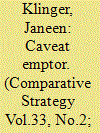

|
|
|
|
|
| Publication |
2014.
|
| Summary/Abstract |
Although intuitively social science has much to contribute to strategy, this article examines the difficulty for strategists doing so. To illustrate the difficulty, the article draws on two social science theories that provided conceptual frameworks for U.S. strategy in the 1960s: deterrence/coercion theory and modernization theory. The article also draws on the cases of Project Camelot in the 1960s and the recent use of human terrain teams to illustrate the difficulty encountered by the military when it tries to use social scientists operationally.
|
|
|
|
|
|
|
|
|
|
|
|
|
|
|
|
| 2 |
ID:
179272
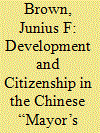

|
|
|
|
|
| Summary/Abstract |
This article applies Distelhorst and Fu’s (2019) typology of citizenship performances to an original sample of 200 online Mayor’s Mailbox letters to examine how scripts of citizenship differ between richer and poorer areas of China. Using a mixed-methods approach, I find that letters in more developed areas are significantly less likely to present the writer as a submissive subject, but no more likely to frame complaints in terms of rights and legality. I also find that many letter writers behave as “constructive citizens” by stressing their interest in helping the authorities improve local governance. These findings challenge linear understandings of the value shift that follows development, and suggest that the focus on contention in the literature on citizenship under authoritarianism overlooks other, more cooperative forms of political participation in consolidated autocracies.
|
|
|
|
|
|
|
|
|
|
|
|
|
|
|
|
| 3 |
ID:
118183
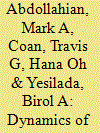

|
|
|
|
|
| Publication |
2012.
|
| Summary/Abstract |
The relationship between economic development, cultural change, and political liberalization is often explored through the lens of classic modernization theory. Recent scholarship attempts to extend classic theory to be more closely aligned with empirical reality. Under the human development perspective, economic prosperity acts as a catalyst for cultural development, leading to social values that favor liberalization, and thus promotes effective democracy. Using a systems dynamic approach, we formalize the dynamic causal structure specified in the human development perspective, develop a novel econometric procedure (Genetic Algorithm Nonlinear Least Squares) to estimate the parameters of highly nonlinear, continuous time models, and verify our formal model using five waves of data from the World Values Survey. Our results indicate that development is strongly nonlinear and path dependent: Economic progress is a necessary condition for successful secularization and expressive political behavior, which are antecedents for lasting democratic institutions. Thus, policies and institutional arrangements must be tailored to, not outpace, a nation's level of economic progress to create demand for a secular and expressive political marketplace where democratic institutions can sustain and thrive.
|
|
|
|
|
|
|
|
|
|
|
|
|
|
|
|
| 4 |
ID:
153880
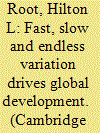

|
|
|
|
|
| Summary/Abstract |
This article explores the dynamics of institutional adaptation in fast-growing, highly interconnected polities in the developing world, and challenges the thesis in modernization theory which posits that economic growth and thus higher per-capita income lead over time to democracy. One mechanism often proposed to explain this link is the idea that economic growth and higher per capita income in a society lead individual citizens in that society to become more receptive to democratic values and norms, and that this receptivity can pave the way for the birth of democracy. Yet evidence increasingly demonstrates that the link is at best tenuous and often not empirically valid. Why have many fast-growing economies and modernizing societies not made a transition to democracy, as predicted by modernization theory? This paper addresses this question, with ideas from complex adaptive systems and evolutionary social psychology, as well as case analyses of Turkey and China.
|
|
|
|
|
|
|
|
|
|
|
|
|
|
|
|
| 5 |
ID:
064211
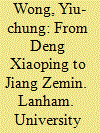

|
|
|
|
|
| Publication |
Lanham, University Press of America, 2005.
|
| Description |
xi, 361p.: tablepbk
|
| Standard Number |
076183074X
|
|
|
|
|
|
|
|
|
|
|
|
Copies: C:1/I:1,R:0,Q:0
Circulation
| Accession# | Call# | Current Location | Status | Policy | Location | IssuedTo | DueOn |
| 049804 | 951/WON 049804 | Main | Issued | General | | RF153 | 13-Aug-2023 |
|
|
|
|
| 6 |
ID:
154930


|
|
|
|
|
| Summary/Abstract |
Turkey’s current slide to authoritarianism creates a puzzle for democratization theory, as it challenges the commonly accepted relationship between wealth and democracy. There is a large consensus in the democratization literature that a robust civil society, a growing middle class, and high GDP per capita create a conducive environment for an authoritarian country to democratize and make it harder for democratic countries to turn authoritarian. Prominent scholars of Turkish politics used these arguments when conceptualizing Turkey’s liberalization and the checkered democratization process in the post-1980 period. Yet, despite positive economic growth, a flourishing civil society, and a rising middle class, Turkey drifted toward a competitive authoritarian regime during the past five years. The article addresses this puzzle and discusses how the Justice and Development Party (Adalet ve Kalkınma Partisi, AKP) co-opted Islamic civil society organizations and attached conservative businessmen to the state through crony-relations, thereby stripping these societal forces from their democratizing qualities.
|
|
|
|
|
|
|
|
|
|
|
|
|
|
|
|
| 7 |
ID:
167778
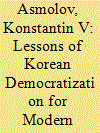

|
|
|
|
|
| Summary/Abstract |
Amid debates over democratic transition in Eastern Asia the South Korean case more often than not drops out of sight. Meanwhile, the fall of the Syngman Rhee regime and the unsuccessful democratic experiment of the Second Republic, the modernization of the country during Pak Chung-hee rule and the attempts at democratization during the military dictatorship of Chun Doo-hwan are of great illustrative value.
|
|
|
|
|
|
|
|
|
|
|
|
|
|
|
|
| 8 |
ID:
116075
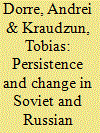

|
|
|
|
|
| Publication |
2012.
|
| Summary/Abstract |
This paper examines persistence and change in the Soviet Union's and then Russia's relations with Afghanistan with respect to development and security. First, a detailed analysis of the promise and reality of Soviet development assistance reveals conceptual shortcomings in their attempt to induce economic development in Afghanistan. The Soviet Union's heritage is then revealed in order to understand Russia's current perception of post-Taliban Afghanistan as well as Russia's emerging interests and commitment to Afghanistan's economic development. This paper argues that Russia will most likely replicate standard industrialization development approaches in contributing to Afghanistan's development. Therefore, Russia will probably run into problems similar to those that led to the failure of the Soviet modernization project, which consisted of large-scale development projects that were inappropriate to the country's institutions and the lives of most Afghans. It is questionable whether such reiteration will induce economic development now, in the complex setting of a fragmented and fragile state with a multitude of external players looking out for their own interests.
|
|
|
|
|
|
|
|
|
|
|
|
|
|
|
|
| 9 |
ID:
074824
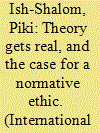

|
|
|
|
|
| Publication |
2006.
|
| Summary/Abstract |
This paper looks at the complex relationship that exists between ideology, international relations theories, and the world of practice. It focuses on the role of theoretical concepts in forming foreign policy, asks whether theoreticians and theories act as agents in the political arena, and if so, what the consequences of this agency are. The paper attempts to show that theoretical concepts have a political role to play in the field of foreign affairs, and that to some degree they shape the reality that they try to study. As such, they blur the dichotomist distinction between subject and object, and should not be considered outside observers, which is a necessary precondition to objectivity. This agency and lack of objectivity, I claim, endow theoreticians with moral responsibility, and obligate the founding of research on morality. In order to demonstrate my claims I focus on U.S. foreign policy toward Latin America under the Kennedy administration, the influence of Walt W. Rostow regarding that policy, and what can be termed the rise and fall of modernization theory.
|
|
|
|
|
|
|
|
|
|
|
|
|
|
|
|
| 10 |
ID:
192500
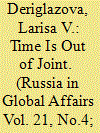

|
|
|
|
|
| Summary/Abstract |
The current direct confrontation between Russia and the Western
countries in Europe was not unexpected, but its possible consequences
are frightening. In this article the author suggests looking at the conflict
between Russia and the EU through the lens of Aleida Assmann’s concept
of “temporal breach” in the “modern time regime” (modernity). One of
the reasons for the escalation is that the conflicting sides have different
visions of the past, present and future, as well as of their place in the new world. The author also traces the development of modernization theory and
analyzes the modernization practices Russia and EU countries chose to use
after 1991. Russia has largely been practicing conservative modernization,
where the state is the main actor relying on certain public demand. The EU
countries have been implementing a multi-vector liberal modernization
model in line with the goals of post-industrial society, with a variety of state
and non-state actors involved and the focus put on the human rights value.
|
|
|
|
|
|
|
|
|
|
|
|
|
|
|
|
| 11 |
ID:
126963
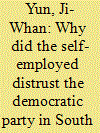

|
|
|
|
|
| Publication |
2013.
|
| Summary/Abstract |
Why did Korea's self-employed voters express their disapproval of the Democratic Party in the 2012 presidential election? This paper argues that this distrust was historically shaped. It originated from the failure of the former Democratic governments (1998-2007) in flexicurity reforms, which jeopardized the livelihoods of the self-employed.
|
|
|
|
|
|
|
|
|
|
|
|
|
|
|
|
|
|
|
|
|